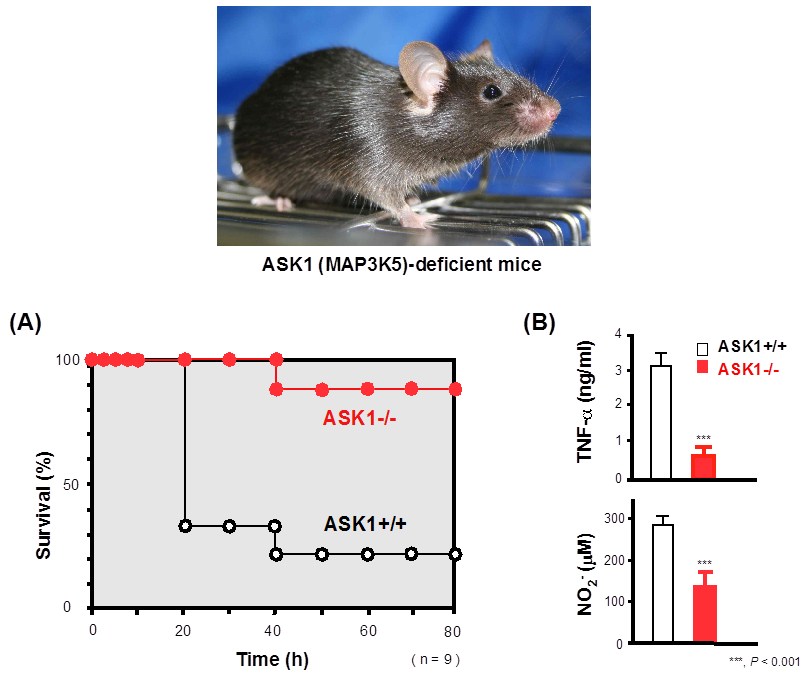|
Cell signaling of stress response via ASK1 B6.129S4-Map3k5<tm1Hijo>/HijoRbrc (RBRC05753)
(A) ASK1-deficient mice (ASK1-/-) are resistant to lipopolysaccharide (LPS)-induced septic shock in vivo. |
| Mitogen-activated protein kinases (MAPKs) are a family of Ser/Thr protein kinases that are involved in many cellular programs such as cell proliferation, differentiation, movement, and death. MAPK signaling cascades are organized into three modules. MAPKs are phosphorylated and activated by MAPK kinases (MAP2Ks), which in turn are phosphorylated by MAP2K kinases (MAP3Ks). Apoptosis signal-regulating kinase 1 (ASK1), also referred to as MEKK5 or MAP3K5, is a member of the MAP3K family that activates the MKK4/7-JNK and MKK3/6-p38 pathways. ASK1 activity is regulated by the redox-sensitive protein thioredoxin (Trx), which forms an inactivated complex with ASK1. The oxidized form of Trx dissociates from ASK1 upon reactive oxygen species (ROS) stimulation, and the tumor necrosis factor (TNF) receptor-associated factors TRAF2 and TRAF6 fully activate ASK1 [1-3]. Ichijo and colleagues reported recently that the E3 ubiquitin ligase Roquin-2 (also called RC3H2) is required for the ROS-induced ubiquitination and degradation of ASK1 [4]. |
| ASK1 is activated by many stimuli using ROS as signaling intermediates, such as signaling via TNF receptor, angiotensin II receptor type 1, and Toll-like receptors TLR4, 7, and 8. ASK1 also activates MAPK pathways in response to endoplasmic reticulum stress and calcium/calmodulin-dependent protein kinase II [2, 3]. Studies using ASK1-deficient mice revealed that cell signaling via ASK1 is related to diseases induced by oxidative stress. ASK1-dependent cytokine production in inflammatory cells promotes tumorigenesis, while another MAP3K family member, ASK2, functions as a tumor suppressor in association with ASK1, suggesting that ASK1 and ASK2 are involved in tumorigenesis by differentially regulating apoptosis and inflammation [5, 6]. |
| Depositor | : | Hidenori Ichijo, D.D.S., Ph.D. Laboratory of Cell Signaling, Graduate School of Pharmaceutical Sciences The University of Tokyo |
|
| Strain name | : | B6.129S4-Map3k5<tm1Hijo>/HijoRbrc | |
| RBRC No. | : | RBRC05753 | |
| Related strains | : | B6.129P2-Map3k6<tm1Hijo>/HijoRbrc RBRC05754 C57BL/6-Map3k15<tm1Hijo>/HijoRbrc RBRC05755 B6.Cg-Map3k5<tm1Hijo> Map3k6<tm1Hijo>/HijoRbrc RBRC05926 B6.Cg-Map3k5<tm1Hijo> Map3k15<tm1Hijo>/HijoRbrc RBRC05927 B6.Cg-Map3k5<tm1Hijo> Map3k6<tm1Hijo> Map3k15<tm1Hijo>/HijoRbrc RBRC05928 |
|
| Related resources from RIKEN BRC |
: | RIKEN DNA Bank Human Resource – MAP3K5 Genome Network Project full-length cDNA clone Clone_ID: IRAK110J03 |
|
| References | : | [1] | Matsuzawa A, Takeda K, Ichijo H. ASK1: UCSD Nature Molecule Pages |
| [2] | Takeda K, Noguchi T, Naguro I, Ichijo H. Apoptosis signal-regulating kinase 1 in stress and immune response. Annu Rev Pharmacol Toxicol.; 48:199-225, 2008. | ||
| [3] | Hayakawa R, Hayakawa T, Takeda K, Ichijo H. Therapeutic targets in the ASK1-dependent stress signaling pathways. Proc Jpn Acad Ser B Phys Biol Sci.; 88(8):434-53, 2012. | ||
| [4] | Maruyama T, Araki T, Kawarazaki Y, Naguro I, Heynen S, Aza-Blanc P, Ronai Z, Matsuzawa A, Ichijo H. Roquin-2 promotes ubiquitin-mediated degradation of ASK1 to regulate stress responses. Sci Signal.7(309):ra8, 2014. | ||
| [5] | Takeda K, Shimozono R, Noguchi T, Umeda T, Morimoto Y, Naguro I, Tobiume K, Saitoh M, Matsuzawa A, Ichijo H. Apoptosis signal-regulating kinase (ASK) 2 functions as a mitogen-activated protein kinase kinase kinase in a heteromeric complex with ASK1. J Biol Chem.; 282(10):7522-31, 2007. | ||
| [6] | Iriyama T, Takeda K, Nakamura H, Morimoto Y, Kuroiwa T, Mizukami J, Umeda T, Noguchi T, Naguro I, Nishitoh H, Saegusa K, Tobiume K, Homma T, Shimada Y, Tsuda H, Aiko S, Imoto I, Inazawa J, Chida K, Kamei Y, Kozuma S, Taketani Y, Matsuzawa A, Ichijo H. ASK1 and ASK2 differentially regulate the counteracting roles of apoptosis and inflammation in tumorigenesis. EMBO J.; 28(7):843-53, 2009. | ||
| August 2014 Contact: Shinya Ayabe, Ph.D. Experimental Animal Division, RIKEN BioResource Center All materials contained on this site may not be reproduced, distributed, displayed, published or broadcast without the prior permission of the owner of that content. |






